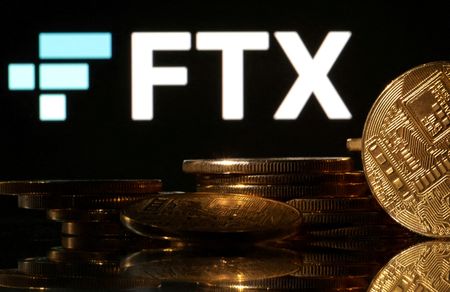(Reuters) – After the collapse of major cryptocurrency exchange FTX, the industry is bracing for further pain because of the exposure of many companies to FTX and its affiliated trading firm Alameda Research.
Here are some firms that have given information about their exposure to FTX.
BLOCKFI
BlockFi filed for bankruptcy on Nov. 28, weeks after the crypto lender said it was pausing client withdrawals. In July, FTX had signed a deal with an option to buy BlockFi for up to $240 million.
GENESIS
The crypto lending arm of U.S. digital asset broker Genesis Trading suspended customer redemptions earlier this month, citing the sudden failure of FTX.
Genesis said in a tweet on Nov. 10 that its derivatives business has approximately $175 million in locked funds on FTX.
However, Genesis had no material exposure to FTX’s native token FTT, or any other tokens issued by centralized exchanges, the firm said in a tweet on Nov. 9.
BINANCE
Binance Chief Executive Changpeng Zhao sparked concerns among investors on Nov. 6 when he said in a tweet that the crypto exchange would sell its holdings of FTT.
Zhao told a Twitter spaces event that Binance had previously held $580 million worth of FTT, of which “we only sold quite a small portion, we still hold a large bag.”
CELSIUS NETWORK
Bankrupt crypto lender Celsius Network said in a tweet on Nov. 11 that it had 3.5 million Serum tokens (SRM) on FTX as well as around $13 million in loans to FTX-linked trading company Alameda Research. The loans were under-collateralised, mostly by FTT tokens, Celsius said.
COINBASE
Coinbase Global Inc said in a blog post on Nov. 8 that it had $15 million worth of deposits on FTX. It said it had no exposure to FTT or Alameda Research and no loans to FTX.
COINSHARES
Crypto asset manager CoinShares has $30.3 million worth of exposure to crypto exchange FTX, it said in a statement on Nov. 10.
CoinShares CEO Jean-Marie Mognetti said the group’s financial health remains “strong.”
CRYPTO.COM
Singapore-based crypto exchange Crypto.com said on Nov. 14 it had moved about $1 billion to FTX over the course of a year, but most of it was recovered and exposure at the time of FTX’s collapse was less than $10 million.
CEO Kris Marszalek said the firm would prove wrong all naysayers who thought the platform was in trouble, adding it had a robust balance sheet and took no risks.
GALAXY DIGITAL
Crypto financial services company Galaxy Digital Holdings Ltd said in its third-quarter earnings statement on Nov. 9 – the day after FTX froze withdrawals – that it had $76.8 million worth of exposure to FTX, of which $47.5 million was “in the withdrawal process.”
GALOIS CAPITAL
Hedge fund Galois Capital had half its assets trapped on FTX, co-founder Kevin Zhou told investors in a recent letter, the Financial Times reported, estimating the amount to be around $100 million.
Galois did not respond to requests for comment by Reuters.
KRAKEN
Cryptocurrency exchange Kraken said on Nov. 10 that it held about 9,000 FTT tokens on the FTX exchange and was not affected “in any material way”.
SILVERGATE CAPITAL CORP
Silvergate Capital Corp said on Nov. 11 FTX represented less than 10% of $11.9 billion in deposits from all digital asset customers as of Sept. 30.
The financial solutions provider to digital assets also said Silvergate has no outstanding loans or investments in FTX, and that FTX is not a custodian for Silvergate’s bitcoin-collateralized Silvergate Exchange Network (SEN) leverage loans.
VOYAGER DIGITAL
Bankrupt crypto lender Voyager Digital, which was set to sell its assets to FTX after a $1.42 billion deal bid by the exchange in September, had a balance of approximately $3 million at FTX.
It also reopened the bidding earlier this month.
GRAYSCALE
Crypto asset manager Grayscale, whose flagship Grayscale Bitcoin Trust (GBTC) is the world’s largest bitcoin fund, told investors that the recent market events have had no impact on its product operations or the security of the holdings in its funds.
(Reporting by Elizabeth Howcroft in London, Mehnaz Yasmin, Medha Singh and Niket Nishant in Bengaluru and Hannah Lang in Washington; Editing by Jan Harvey and Matthew Lewis)





